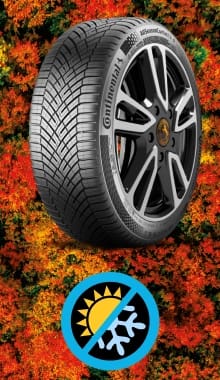Are you wondering, “What are all-season tires?” If you’re in search of a convenient and versatile tire solution that can handle various weather conditions, all-season tires are the answer you’ve been looking for.
When it comes to choosing the right tires for your vehicle, the options can be overwhelming. From winter tires built for icy roads to summer tires designed for enhanced performance, there’s a wide array of choices available. However, for those seeking a convenient and versatile solution that can handle various weather conditions, all-season tires emerge as a popular and practical choice. In this blog post, we will delve into the world of all-season tires, exploring their benefits, characteristics, and why they make an excellent option for everyday drivers.

What are All-Season Tires?
All-season tires, as the name implies, are designed to provide satisfactory performance throughout the year, regardless of the weather conditions. These tires are engineered to balance various aspects such as tread pattern, rubber compound, and construction to ensure a stable and dependable driving experience in both hot summers and cold winters.
Versatility: The Key Advantage
The primary advantage of all-season tires lies in their versatility. Unlike specialized tires that excel in specific conditions, all-season tires offer a well-rounded performance, making them suitable for drivers who encounter a mix of weather conditions. Whether it’s dry roads, light snow, rain-soaked surfaces, or moderately cold temperatures, these tires adapt to the situation, offering a balanced driving experience.
Tread Design and Performance
One of the critical features that make all-season tires adaptable is their unique tread design. The tread pattern typically incorporates a combination of large, independent tread blocks for dry grip and stable handling, as well as sipes (minor cuts) that enhance traction on wet or snowy surfaces. This design helps in evacuating water efficiently, reducing the risk of hydroplaning on wet roads.
While all-season tires do not provide the same level of traction as dedicated winter tires on icy surfaces, they perform better than summer tires in cold weather, making them a good compromise for regions with mild winters.
All-Season Tire Construction
The construction of all-season tires plays a crucial role in their performance. These tires are made from a rubber compound that remains flexible over a wide range of temperatures, allowing them to maintain grip and traction in different weather conditions. However, the downside is that the rubber in all-season tires may wear faster than that in summer tires, which are formulated for warm-weather performance.
Additionally, some all-season tires come with reinforced sidewalls, enhancing the tire’s durability and improving stability during cornering and braking.
Longevity and Cost-Effectiveness
Another significant advantage of all-season tires is their longevity. Since drivers don’t need to switch between seasonal tires, all-season tires tend to wear more evenly over time. This prolonged tread life contributes to cost-effectiveness, as drivers can get more mileage out of their tires before needing replacements.
Moreover, the money saved from not buying separate sets of winter and summer tires and the reduced maintenance costs makes all-season tires an economical choice for many drivers.
All-Season vs. All-Weather Tires
It’s essential to differentiate between all-season and all-weather tires. While both are designed for year-round use, all-weather tires are more suitable for regions with harsher winter conditions. All-weather tires carry the Three Peak Mountain Snowflake (3PMSF) symbol, indicating that they meet the required standards for winter driving. On the other hand, all-season tires may not carry this symbol and are better suited for milder winters.
Best Practices for All-Season Tire Usage
To maximize the benefits of all-season tires, it’s crucial to follow some best practices:
a. Regular Maintenance: Keep your tires properly inflated and check for signs of wear to ensure optimal performance and longevity.
b. Rotation: Rotate your tires regularly to promote even wear and extend their lifespan.
c. Speed and Load Rating: Always choose all-season tires with the appropriate speed and load rating for your vehicle.
d. Driving Habits: Drive responsibly and adjust your driving style to prevailing weather conditions for safer journeys.
In conclusion
In conclusion, all-season tires offer a balanced and versatile option for drivers who encounter a mix of weather conditions throughout the year. Their unique tread design, durable construction, and cost-effectiveness make them a popular choice for everyday use. While they may not outperform specialized tires in extreme conditions, all-season tires strike a perfect compromise for most drivers, providing peace of mind and consistent performance. Whether it’s navigating through light snow or driving on wet roads, all-season tires prove to be a reliable companion for your year-round driving needs. So, equip your vehicle with these dependable tires, and you’ll be ready to tackle whatever the road throws your way.
For more in-depth information and expert insights on all-season tires, you can check out reputable automotive resources like Consumer Reports [link: www.consumerreports.org].